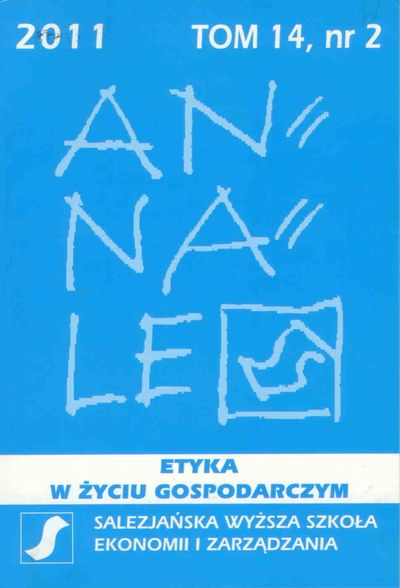Etyka zawodowa likwidatora szkód w towarzystwie ubezpieczeniowym
DOI:
https://doi.org/10.18778/1899-2226.14.2.13Słowa kluczowe:
damage adjuster, personal damage, professionalism of a damage adjuster, profession of public trust confidentiality of aggrieved party recordsAbstrakt
The subject of this abstract is the description of professional ethics of a damage adjuster in an insurance company. The work of a damage adjuster in a financial institution is more than looking after the profit of the company which goes to the company shareholders. The job is very often regarded as a position of public trust. When the aggrieved parties report a damage to an insurance company they not only entrust their personal data, which are protected by law, but they also reveal confidential information like medical records, their income and important personal documentation. Reporting a damage, the aggrieved party has to be sure that the entrusted information will be only used for the purpose of the liquidation of damages. On the other hand, the damage adjuster is supposed to know that when contacting the aggrieved party, who is not an expert in insurance, should never use the professional knowledge to make decisions which are not in favour of the party. In this case the damage adjuster has two roles; not only is he a professional who is responsible for the liquidation of the damage but he is also a representative of a financial institution to the aggrieved party. Therefore there are also some marketing aspects involved in the process because quick and accurate handling of the liquidation process can convince the aggrieved party to choose the insurance company’s offer. In my paper I am going to focus on ethical issues of the profession of a damage adjuster both when interacting with clients and decision taking. I will try to show what ethical and moral standards a person working as a damage adjuster should follow. These being especially important for the profession of a personal damage adjuster. The role of a damage adjuster is not only the liquidation of the damage following procedures but also help and support for the aggrieved party by explaining the procedures, existing rights and claims.
Bibliografia
Boroń E., Kultura i etyka w pracy biurowej, scholaris.pl/cms/index.php/.../prezentacja_P_6150_boroń.html
Google Scholar
Kodeks postępowania cywilnego, Dz. U. Nr 43, poz. 296 z 1964 r. z późniejszymi zmianami.
Google Scholar
Polska Izba Ubezpieczeń, Zasady etyki w działalności ubezpieczeniowej uchwalone w dniu 17 grudnia 1998 r. przez Zwyczajne Zebranie Przedstawicieli, www2.allianz.pl/pdf/internauci/zasady_etyki.pdf
Google Scholar
Świtalska E., Rola zakładów ubezpieczeń jako instytucji zaufania publicznego, www.cebi.pl/konf03/konf03_05.doc
Google Scholar
Ustawa o działalności ubezpieczeniowej, Dz. U. 124, poz. 1151 z późniejszymi zmianami.
Google Scholar
Pobrania
Opublikowane
Jak cytować
Numer
Dział
Licencja

Utwór dostępny jest na licencji Creative Commons Uznanie autorstwa – Użycie niekomercyjne – Bez utworów zależnych 4.0 Międzynarodowe.









